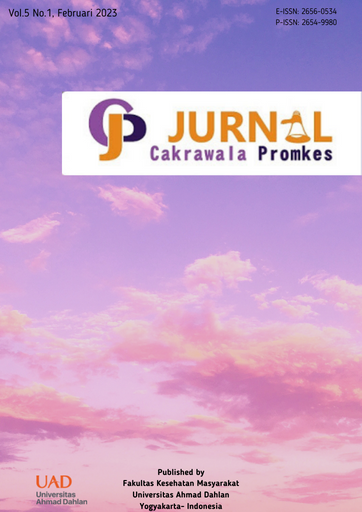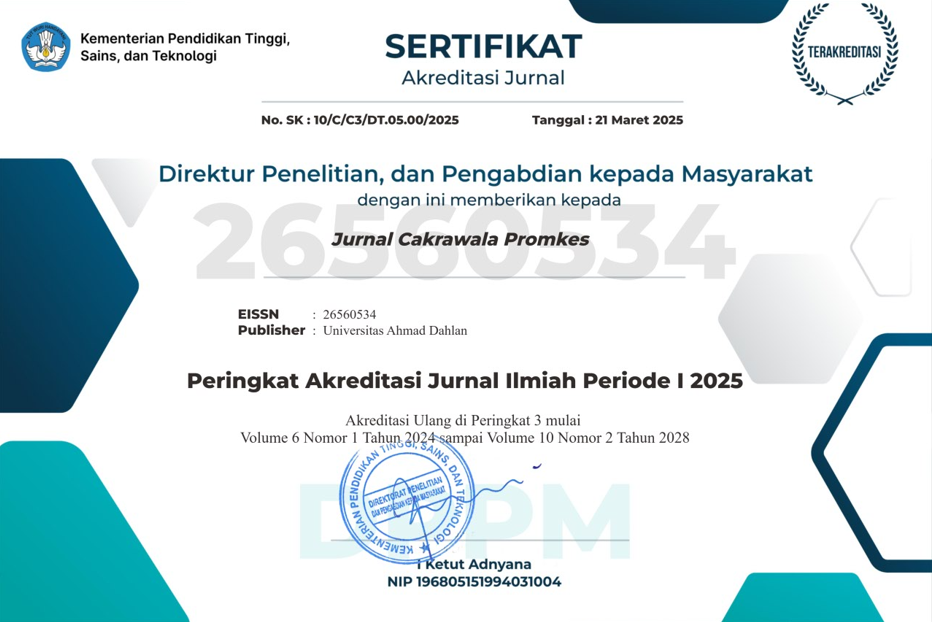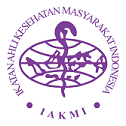Hubungan Konsumsi Kopi dengan Kejadian Kecemasan pada Mahasiswa Preklinik Angkatan 2020 Fakultas Kedokteran Universitas Tadulako
DOI:
https://doi.org/10.12928/promkes.v4i2.5403Keywords:
Anxiety, Coffee, Caffeine, Consumption, Medical StudentAbstract
Coffee is a beverage made from seed extract that is consumed in approximately 2.25 billion glasses per day around the world. Students are pressed for time due to the hectic lecture system and must complete assignments or prepare for block exams at night. Students can combat feelings of sleepiness and fatigue in a variety of ways, one of which is to consume caffeine-containing beverages, specifically coffee, which has the negative effect of causing anxiety disorders. The goal of this study is to see if there is a link between coffee consumption and anxiety in preclinical students from Tadulako University's Medical Faculty's batch 2020. The cross-sectional method was used in this study. Purposive sampling was used to collect the samples. The 20-item Zung Self-Rating Anxiety Scale and an 11-item coffee consumption questionnaire were used to assess anxiety. The Spearman rho correlation test was used to calculate the correlation between two variables. The criteria were met by 108 respondents, with an average age of 18.7±0.6 years, 87 women (80.6%), and 21 men (19.4%). Following coffee consumption, the level of anxiety among students was found to be dominated by the absence of anxiety or normal (73.1%), mild anxiety (24.1%), and moderate anxiety (2.8%). There was no association found between coffee consumption and student anxiety levels. This study suggested that other factors should be considered when investigating student anxiety.
References
Maulidan M, Alam TS. Insomnia dan Kecemasan pada Masyarakat yang Mengkonsumsi Kopi. J Ilm Mhs Fak Keperawatan. 2018;3(3):241–7.
Liveina, Artini. Pola Konsumsi Dan Efek Samping Minuman Mengandung Kafein Pada Mahasiswa. E-Jurnal Med Udayana. 2014;3(4):1–12.
Fahmi Arwangga A, Raka Astiti Asih IA, Sudiarta IW. Analisis Kandungan Kafein Pada Kopi Di Desa Sesaot Narmada Menggunakan Spektrofotometri Uv-Vis. J Kim. 2016;10(1):110–4.
Temple JL, Bernard C, Lipshultz SE, Czachor JD, Westphal JA, Mestre MA. The Safety of Ingested Caffeine: A Comprehensive Review. Front Psychiatry. 2017;8(May):1–19.
Prasetio A. Gangguan Psikiatri Terkait Kafein. Cermin Dunia Kedokt. 2020;47(5):378–82.
Dharmadi, Ni Luh Gede Ayu Candranita, Susy Purnawati Handari LMIS, Adiputra. Hubungan Konsumsi Kopi terhadap Peluang Kelulusan Ujian Blok Mahasiswa PSSKPD Angkatan 2017 Fakultas Kedokteran Universitas Udayana. J Med Udayana [Internet]. 2019;10(2):21–7. Available from: https://ojs.unud.ac.id/index.php/eum/article/view/71736
Bertasi RAO, Humeda Y, Bertasi TGO, Zins Z, Kimsey J, Pujalte G. Caffeine Intake and Mental Health in College Students. Cureus. 2021;13(4).
Meissner JL. The Relationship Between Caffeine Intake And Self-Reported Anxiety Levels In College Students. Kent State University College. 2019.
Hui CY. Caffeine Consumption, Perceived Stress and Anxiety in Singaporean Undergraduates. 2020.
Jin MJ, Yoon CH, Ko HJ, Kim HM, Kim AS, Moon HN, et al. The relationship of caffeine intake with depression, anxiety, stress, and sleep in Korean adolescents. Korean J Fam Med. 2016;37(2):111–6.
van Calker D, Biber K, Domschke K, Serchov T. The role of adenosine receptors in mood and anxiety disorders. J Neurochem. 2019;151(1):11–27.
Richards G, Smith A. Caffeine consumption and self-assessed stress, anxiety, and depression in secondary school children. J Psychopharmacol. 2015;29(12):1236–47.
International Food Information Council Foundation (IFIC). Caffeine and Health. Caffeine; 2010.
Wang HR, Woo YS, Bahk WM. Caffeine-induced psychiatric manifestations: A review. Int Clin Psychopharmacol. 2015;30(4):179–82.
Bawazeer NA, AlSobahi NA. Prevalence and Side Effects of Energy Drink Consumption among Medical Students at Umm Al-Qura University, Saudi Arabia. Int J Med Students. 2013;1(3):104–8.
De Carvalho TS, Cardoso PB, Santos-Silva M, Lima-Bastos S, Luz WL, Assad N, et al. Oxidative Stress Mediates Anxiety-Like Behavior Induced by High Caffeine Intake in Zebrafish: Protective Effect of Alpha-Tocopherol. Oxid Med Cell Longev. 2019;2019.
Suartiningsih NM, AyanPutri WCWS, Ani LS. Depresi, kecemasan dan kosumsi kopi berhubungan dengan kejadian insomnia pada mahasiswa PSPD FK UNUD angkatan 2016. E-Jurnal Med. 2018;7(8):1–6.
Suhadi TP, Samatra DPGP, Nuartha AABN. Faktor-faktor yang mempengaruhi kejadian insomnia pada mahasiswa psskpd angkatan 2016 di fakultas kedokteran universitas udayana. J Med Udayana. 2021;10(4):80–5.
Anwari SR. Perilaku konsumsi kopi di kalangan mahasiswa di kafe sepanjang jalan kalpataru kota malang. J Ilm Mhs Fak Ekon dan Bisnis. 2018;6(2):1–14.
Agung R, Duma K, Yudia RCP, Ibrahim A, Sawitri E. Hubungan Konsumsi Kafein dengan Konsentrasi Belajar Mahasiswa Universitas Mulawarman. J Verdure. 2022;4(1):419–27.
Downloads
Published
Issue
Section
License
Copyright (c) 2022 Rizka Novia Idrus, Fitriah Handayani, Ketut Suarayasa, Mohammad Salman

This work is licensed under a Creative Commons Attribution-ShareAlike 4.0 International License.
Authors who publish with JCP: Jurnal Cakrawala Promkes agree to the following terms:
- Authors retain copyright and grant the journal the right of first publication with the work simultaneously licensed under a Creative Commons Attribution License (CC BY-SA 4.0) that allows others to share the work with an acknowledgement of the work's authorship and initial publication in this journal.
- Authors are able to enter into separate, additional contractual arrangements for the non-exclusive distribution of the journal's published version of the work (e.g., post it to an institutional repository or publish it in a book), with an acknowledgement of its initial publication in this journal.
- Authors are permitted and encouraged to post their work online (e.g., in institutional repositories or on their website) prior to and during the submission process, as it can lead to productive exchanges, as well as earlier and greater citation of published work.

This work is licensed under a Creative Commons Attribution-ShareAlike 4.0 International License












